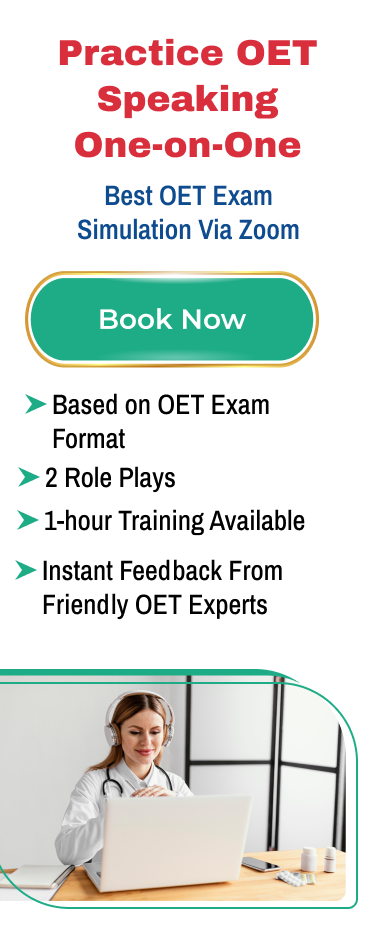Don’t Worry So Much About OET Speaking


Most people get stressed about exams. Nervousness is normal but it can get in the way of your performance if you are overly apprehensive, particularly in oral exams that require you to speak aloud in a foreign language. So, what should you do? Calm yourself, prepare well and build your confidence prior to arranging your test date. It is possible!
The OET speaking sub-test is one area that, well, just makes people a bit concerned. Many candidates worry about the conversation that they will need to engage in with an interlocutor. Part of this worry comes from its completely unpredictable nature. After all, you could be asked to talk about almost anything within your field – and for some fields that is a truly massive range of potential topics. No one could possibly prepare 100% to talk about all of them.
Is this a major problem? No. First of all, you will be doing the OET test according to your particular discipline and so you should already know the material in terms of actual medical content…so, relax. There will be nothing that is of a completely specialist nature, and it should all be accessible to people just like you. It is unlikely that there will be anything that will be entirely unfamiliar to you.
In addition, it is important to remember that the OET speaking test is first and foremost a test of your English abilities. The examiner is not checking to see whether you are qualified in your profession. This is already assumed. Rather, they just want to give you a grade that reflects how well you can speak English.
Preparing for the Role Play
Although OET is a specific medical English test, it is still essentially an English test. In other words, although all the content will be related to the medical profession, it will also be fundamentally a test of your English abilities. You will be assessed on things like grammar, vocabulary, and pronunciation, just like in other, more general English tests.
For this reason, prior to your exam, you should worry more about polishing your English skills rather than whether you will know much about the medical issues that may be raised in the role play. It does not make sense to worry about that as you could well be asked about almost any aspect of your field.
Instead, it is better for you to prepare by improving your overall English ability and your English skills relating to dealing with patients. These are the sorts of thing that the examiners will pay attention to while considering your final grade. For instance, if you are asked about treatment relating to a detached retina, you will not be judged on your medical knowledge of this issue, but rather on how well you explain your ideas. Even if the advice you gave was poor, the examiner could not deduct points from your score as long as it was stated in good English. If you have trouble with this, just think about what you would normally say to a patient in your own language, then look up the English sentence for that. Once you know how it is said in English, repeat it to yourself many times. Do that again and again for every nursing situation you think you may come across. Then, during test day, it will come naturally to you.
It will also be useful to spend a little time looking at general English medical terms in your particular area of study such as the names of illnesses, treatments, and medical equipment. These are all useful to know in case they appear on the role play card or are necessary for you to talk about in the conversation.
Conclusion
When it comes to OET, it is more important to be accurate in your use of English than accurate in your actual medical advice. Your medical knowledge and capabilities are judged by other authorities; not the people who make the OET test. If you are feeling worried about the content of the speaking exam, then you should relax and take the advice in this article to not worry about that sort of thing. You will only be judged on how well you can speak English.













I have a problem in answering reading part A
Skimming and Scanning Techniques: Ace That OET Reading
OET Reading Part A: Play the Numbers Game
Practice more roleplay but still I can’t able to talk condinuesly
Fluency is only one of the criteria, you can easily achieve 350 or more. Let’s show you how OET Speaking Practice